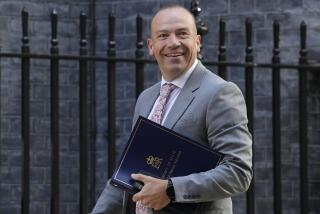Britain Tramples on Rights
- Share via
The conventional wisdom has long been that Britain doesn’t need an American-style Bill of Rights. The Mother of Parliaments, the lively press and the general civility of British life were sufficient, it was thought, to prevent any government from trampling on civil liberties. But several startling announcements by the government of Prime Minister Margaret Thatcher have made thoughtful Britons less sanguine about whether their rulers can be trusted to respect individual rights and liberties.
In the past month the government has banned broadcast interviews with anyone who refuses to renounce violence in Northern Ireland and has declared that it will suspend a suspect’s right to remain silent when questioned by police. The National Council for Civil Liberties has condemned these moves, and the National Union of Journalists has authorized a one-day protest strike later this week, but there seems no way to stop Thatcher. The broadcast ban was quickly approved by the House of Commons, where the Conservatives’ 101-seat margin virtually guarantees passage of Thatcher’s legislation.
The target for these moves, of course, is the murderous Irish Republican Army. The measures are the result of a security review undertaken after eight British soldiers were killed in an IRA bomb attack on a troop bus in August. But the effect will be felt by law-abiding activists in Sinn Fein, the IRA’s entirely legal political arm, and eight other organizations as well as by terrorists. The broadcast ban applies even to Gerry Adams, the Sinn Fein president elected to Parliament in 1983.
Thatcher’s justification for denying the IRA television and radio time is that terrorists cannot flourish without what she calls “the oxygen of publicity.” But neither can the truth. The IRA’s allure is more likely to be diminished than enhanced if Sinn Fein leaders are called to account on the public airwaves for the group’s excesses. The very real danger is that Thatcher’s ban will play into the hands of the fanatics who argue that a political dialogue with London is impossible, that Britain understands only bullets and bombs. Adams, whose party won 11% of the Northern Ireland vote in 1987, professes delight.
By suspending the right to silence, first in Northern Ireland and eventually in England and Wales, Thatcher threatens a pillar of Anglo-American law that has survived since the 17th Century. The privilege against self-incrimination originated in the courts’ concern that ill-educated prisoners could be tricked or coerced into making false confessions. It has been broadened to embrace the principle that even allowing a prosecutor to point out a suspect’s silence in the face of an accusation amounts to self-incrimination. IRA suspects have become skilled at maintaining a stony silence during police interrogation, then offering elaborate alibis when brought to trial. “Justice is being threatened,” complains Tom King, British secretary for Northern Ireland, though it seems to us that the remedy that he and Thatcher propose does not advance the cause of justice, either. They would allow a judge to draw inferences from a suspect’s original silence--presumbly the questionable conclusion that anyone who holds his tongue at a police station must be guilty.
Still more ill-advised, repressive measures may be in store. Britain’s far right and the shrillest of Ulster’s Protestants are demanding preventive detention of suspected terrorists and an outright ban on Sinn Fein. The British government’s frustration and fury at the continuing IRA atrocities are understandable, but Thatcher’s heavy-handed response is unlikely to move troubled Ulster any closer to peace.
More to Read
Sign up for Essential California
The most important California stories and recommendations in your inbox every morning.
You may occasionally receive promotional content from the Los Angeles Times.













